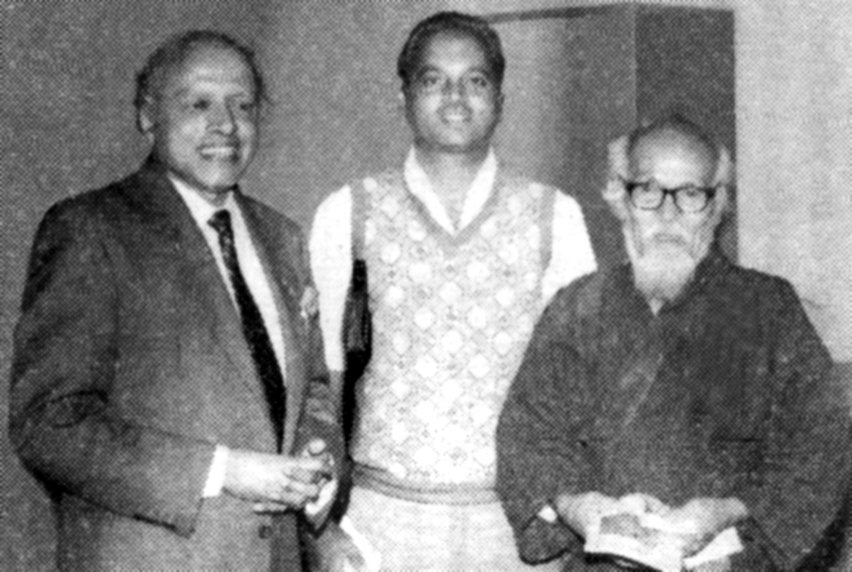Scientist's Novel Technique Raises Raisin Yields
The article Published in "The Times of India" Thursday, May 21, 1988 National Edition Pune

V. S. Bawasakar (Centre) flanked on his right by M.S. Swaminathan & the revolutionary
Japanese farmer Masanobu Fukuoka of 'One Straw Revolution' fame.
"The raisins come from the organic grapes grown in the Vineyards of Nivrutti Khadke at Shetphal, a highly drought-prone and infertile area of Sholapur district," says Mr. Bawasakar. "But it took him two years to be convinced of the efficacy of my techique, which does not use chemical fertilisers and pesticides. Instead, I use naturally-made organic manure and special herbal powder and homoeopathic formula."
Using Mr. Bawasakar's techiques, farmers at Kasegaon in Sangli have harvested 20 tonnes of plump watermelons per acre with in barely 85 days of seeding. "The farmer made Rs. 68,000 on the fruits on which the commission agent earned and equal amount by selling them to an exporter. " says Mr. Bawasakar. Similarly, farmers in Pune, Jalgaon, Nasik, Satara and Thane are reported to have made huge profits, using Mr. Bawasakar method to grow a cornucopia of 'Organic' crops, vegetables and flowers, ranging from onions and coriander to papaya, pomegranate, jasmine and roses.
Mr. Bawasakar Started his career as a demonstrator in the early 1960s at the Pune College of Agriculture in Agriculture Chemistry & soil science. He also worked at the sugarcane research station at Padegaon and subsequently rose to Professorship. "The impetus to leave academia for the field came in 1982 when the Indian Agriculture Research Institute in New Delhi invited me to talk to a batch of young scientists," he recalls.
"The topic was the use of industrial waste as a source of crop nutrients," he adds. "The lecture made waves at an international conference on organic recycling. After the Asian agricultural science fraternity, including Professor M.S. Swaminathan, applauded my work, I became bold enough to resign my secure job and work for the transformation of agriculture in India." Today, he runs a thriving agribusiness consultancy institute based in Pune.
Mr. Bawasakar's method focuses on using farm and industrial residues as manure. He has special formulations for promoting growth, prophylactic and curative measures for pest and disease control. "What is more astonishing is that we found that we were able to alleviate the adverse effects of bad weather fluctuations," he says. " During the last season, for instance, farmers all over India suffered drastically because of poor and bad quality yields of cotton, vegetables and fruits and flowers. But in Khandesh, where farmers relied on my techniques, they managed to harvest 10 to 15 quintals per acre of high-quality Organic Cotton-highly in demand in Europe, Particularly Germany, Israel and the U. S. Similarly, where conventional methods yielded hardly one tonne of bad quality grapes, we got 28 tonnes per acre valued at Rs. 35,000 per tonne of export quality grapes.
Mr. Bawasakar has been internationally acclaimed for his work which has won many awards. His latest project involves transmission of agriculture technology through a network of 3,000 farmers all over India selected on the basis of their receptivity and interest. "This is done on the lines pursued on an Israel kibbutz, to make them models of self-sufficiency and excellence. Each center is expected to guide farmers within a periphery of 10 kilometers." he says. " As Mr. Lester Brown of the World watch Institute and others have said, successful agriculture is a consummate skill and science upon which the very survival of mankind depends," he explains. "Therefore, we need motivated youngsters who are willing to absorb the best of techniques to obtain desired results. Only when we transform agriculture and its process industries along with our rural economies will we get the true 'Swaraj' of which Gandhi has dreamed."
